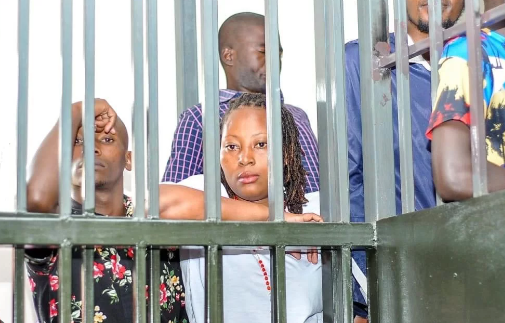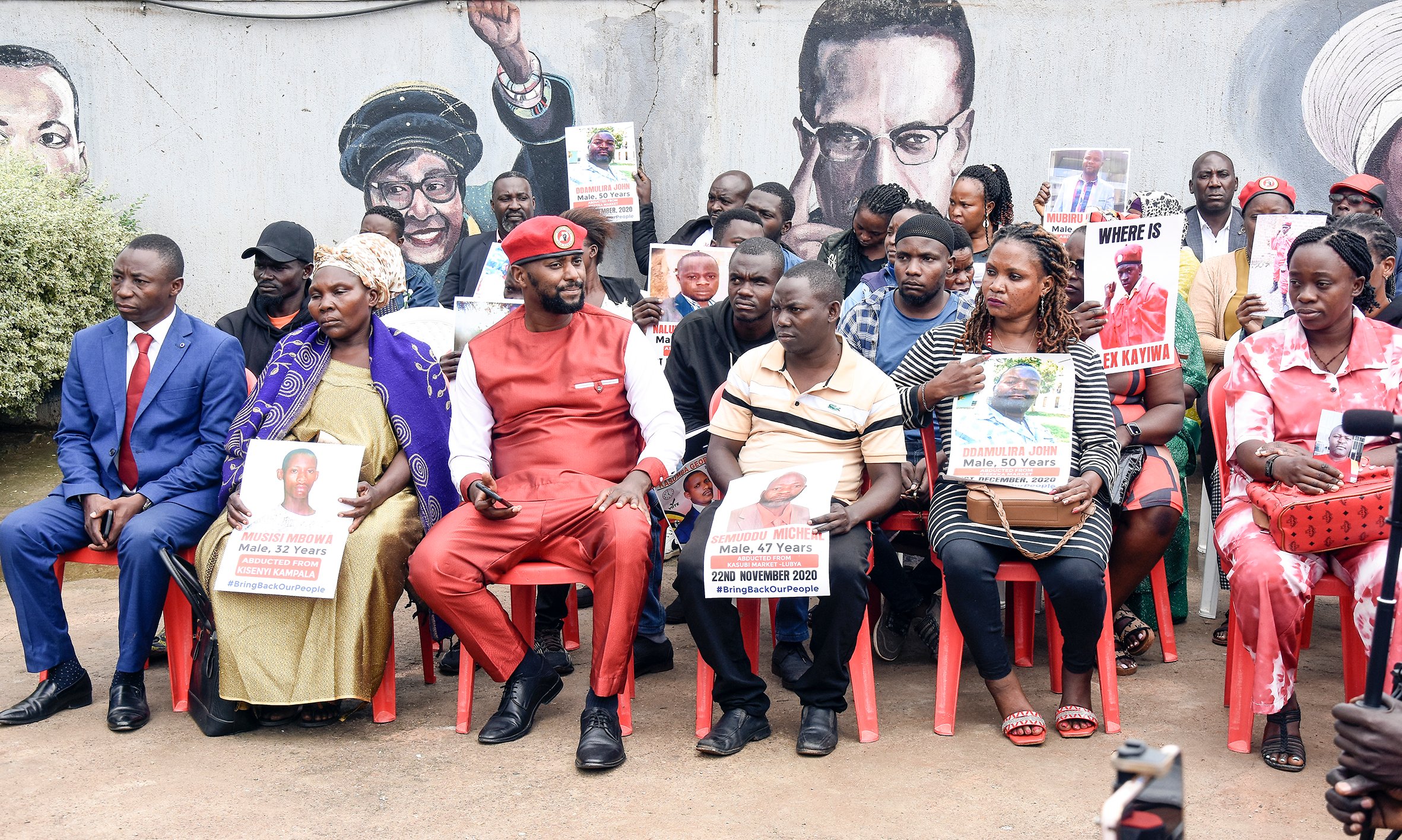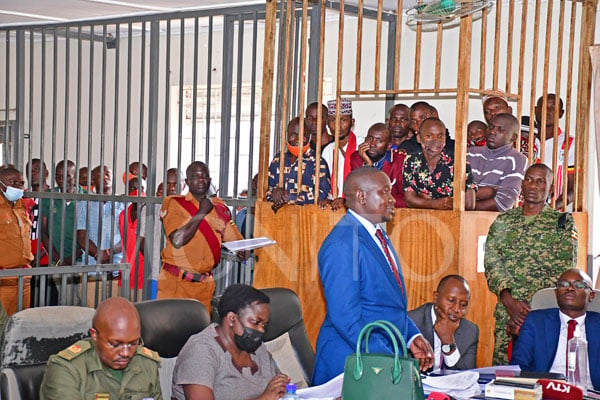
Bobi wine(on car top) and team acknowledges gestures from supporters as he headed for Mukono District on May29. PHOTO/MICHAEL KAKUMIRIZI
The Opposition National Unity Platform (NUP) party has accused State actors of political persecution, citing what its officials call “increased abduction” of party supporters and freezing by police of their leader’s planned nationwide mobilisation tours.
The government, however, swiftly dismissed the claims, with Attorney General Kiryowa Kiwanuka demanding that NUP decouple opposition politics from crime.
“People need to separate between belonging to a political party and committing a crime. When you commit a crime, you are arrested and charged as an individual, not as a member of a political party,” he told this newspaper in a rejoinder.
He added: “So, we should separate the two. No one is arrested because he or she belongs to a particular political party, but because he or she has committed a crime.”
These assurances fly in the face of claims by Uganda’s largest Opposition party that security operatives have intensified “abductions” of their supporters from year start following a lull post-2021 vote.
Police confrontations
Police last week violently broke a rally that NUP leader Robert Kyagulanyi, better known by his stage name Bobi Wine, was holding in the eastern Kamuli District as the first of many planned ones for his countrywide mobilisation tour.

Police lob teargas at the motorcade of National Unity Platform (NUP) party president Robert Kyagulanyi, alias Bobi Wine as they blocked him from accessing Kamuli District in May 2024. PHOTO/ ABUBAKER LUBOWA.
Up to a dozen of party supporters detained following the melee were charged with incitement to violence and disobeying lawful orders and remanded to Kamuli
Government Prisons from where they were reproduced in court on May 27 for mention of their case.
One of them, Bobi Rash, alleged that security forces brutalised him, NUP secretary general Lewis Rubongoya tweeted, basing on briefings he received.
These arrests in Kamuli bring to “more than 100” NUP supporters taken into custody by State actors over the past five months, according to party lawyer George Musisi, who said the incarcerations were calculated to punish loyalists and disrupt party activities a year to the nominations for the 2026 General Election.
Mr Musisi did not provide a full listing of the suspects and we were unable to independently corroborate the account.
“So, the intention [of the arrests] is to send [a message] to supporters that associating with NUP comes with these kinds of consequences,” he said, adding, “It also distracts the party because the party has to mobilise resources [for legal defence and logistics].”
He said in the week of May 20-24, NUP was outstretched to provide legal support to supporters being taken to various courts in different places; in Kamuli in the eastern part of the country, at the General Court Martial in Kampala’s Makindye Division and at the High Court in the centre of the capital and Kasangati in Wakiso District.
Human rights lawyer Eron Kiiza said the renewed arrests of NUP supporters for gathering to organise politically, suggests that the incumbent government fears open democratic challenge and is using State security as an underhand method to tilt the balance in its favour.
“It is a sign of an uneven playing political field. It is a sign that even as Uganda moves towards the 2026 General Election, state resources will be spent on clamping down and intimidating opposition and other critics,” he said.
Such clampdown, he noted, signal a breakdown in the rule of law and respect for the Constitution.
“All this is wrong and unconstitutional because freedom of association, press, and expression are not only fundamental human rights the State exists to protect and promote, but it is also the constitutional duty of every citizen to promote democracy and the rule of law in Uganda. The rigging of the 2026 elections starts now,” he argued.

Attorney General Kiryowa Kiwanuka appears before the Legal and Parliamentary Affairs Committee at Parliament on July 25, 2023. PHOTO | DAVID LUBOWA
Mr Kiryowa, who is the principal legal government advisor, dismissed such claims, and said those taken into custody are suspected of breaking the law and courts will determine whether they are innocent or guilty.
Relatives told NUP officials that some of those apprehended were sent on remand by courts while the whereabouts of others remained unknown to-date.
The country’s largest Opposition party named Mahad Lubega, Hakim Nganda, Faustine Masaba, and a one Mumbya among its incarcerated supporters.
It said Masaba was detained on April 17, but charged with an offence he allegedly committed on April 18, essentially a day after being taken into custody!
His arrest, which relatives characterise as an “abduction”, followed the arrest on February 22, of NUP’s Sharon Kemigisha, the woman councillor for Wandegeya in Kampala.
About 10 days after her disappearance, the party said a well-wisher boda boda transported Ms Kemigisha to the party headquarters after he found her dumped in a part of the capital.
A day later, on February 23, NUP said unknown gunmen aboard a van, nicknamed Drone for its speed, trailed their supporter Owen Muwanga and abducted him on Kampala Northern Bypass.
The abductors, the party noted, wore military uniforms. A similar team grabbed NUP’s Kasule on Entebbe Expressway, while another party loyalist named Nasif Mulindwa was reportedly abducted from his boda boda stage in Kampala. The trio is being held incommunicado, the party noted.
The party’s national mobilisation efforts ran into headwinds when police in Jinja on March 24, violently broke a football match NUP members organised at Buyengo Playground.
Dozens of supporters were arrested, including youth coordinators in eastern Uganda, party leader Bobi Wine tweeted shortly after the raid.
We were unable by press time to establish if detainees had been freed or arraigned in court.

Mr Charles Kiganda (left), the brother of missing NUP supporter John Ddamulira, with other family members during a press briefing at then party headquarters in Kamwokya, Kampala, on October 12, 2023. PHOTO/MICHAEL KAKUMIRIZI.
Mr Rubogonya told Monitor in an interview for this article that the “abductions” of their supporters have a similar pattern: security personnel covertly single each victim, trail them with unmarked cars, corner and violently grab them.
They are carted away to unknown locations and on undisclosed charges, he noted, and both the party and families have to search in several places for clues and to establish the whereabouts, if at all, of the victims.
The alleged manner of the latest arrests, which NUP says resumed from year start, mirror mass abductions of supporters of the party members in the run-up to, during and after the 2021 elections.
Bobi Wine, who was a presidential candidate, came second and his party eclipsed the Forum for Democratic Change (FDC) party to claim the Opposition majority in the 11th Parliament.
The reasons for the arrests varied: from incitement to violence, participating in illegal assembly, disobeying lawful orders to possessing military-type attire.
Brig Felix Kulayigye, the defence public information officer, in comments to this newspaper, said whoever is complaining of being unfairly arrested must blame him or herself for using military insignia.
“Does the ordinary cloth have military pips? So, why are they using those things? We don’t just arrest anyone, but we go for those with such military attires,” he said.
The Uganda People’s Defence Forces (UPDF), for which Brig Kulayigye speaks, on September 18, 2019, gazetted berets, tunics, combat and ceremonial clothing with pips among exclusive army insignia, accessories, uniforms, decorations and marks.
Civilians found dealing in or selling and in possession of or wearing similar articles, according to the notice, face prosecution under UPDF Act, 2005.
The official uniform of NUP, which evolved from the attire of its People Power outfit, is a pipped red overall or red shirt, and corresponding red beret. The Ugandan military claims these mirror its own paraphernalia, explaining the targeting and arrests of NUP supporters.
The party, however, said the army is not being even-handed, citing its failure to apprehend Kitgum Woman Member of Parliament Lillian Aber.
On February 5, a photograph of the legislator in full military attire surfaced on social media, prompting her to apologise publicly and the UPDF to arrest the soldier who gave the uniform to her.
“That issue was explained and Lillian Aber apologised and the chapter was closed. Why are they still bringing the issue here?” Brig Kulayigye said in an attempt to fend off criticism about the army’s apparent double standards.

Kitgum Woman MP, Lillian Aber poses for a photo im army uniform on after flagging off a cleaning exercise by UPDF soldiers in Kitgum District ahead of Tarehe Sita celebrations in February 2024. PHOTO/ COURTESY OF LILLIAN ABER ON X
Ms Aber is a public promoter of an assumed future presidency of First Son Muhoozi Kainerugaba, and President Museveni named her the State Minister for Disaster Preparedness, Relief and Refugees in a March Cabinet reshuffle.
But the political ghosts of the arrest of NUP supporters have refused to rest.
The immediate past Leader of the Opposition in Parliament, Mr Mathias Mpuuga, made securing freedom of missing party supporters a central plank of his tenure and his demands on the floor of Parliament, alongside separate local and international petitions by NUP, prompted the government and the statutory rights body, the Uganda Human Rights Commission (UHRC), to investigate the claims.
As the inquiries commenced, unknown people dumped some of the “disappeared” Opposition supporters in isolated city outskirts, including swamps, with warnings to them to be mute on politics, NUP said.
Others were suddenly arraigned and indicted, some in military courts where their prosecution is ongoing, triggering an avalanche of criticism from rights groups and expanded terrain for legal battle.
Ms Olivia Lutaaya, a young mother, is among Opposition supporters being court-martialled. She was charged with treachery, although she claims to be a prisoner of conscience.
Her predicament brings into the spotlight the continued trial of civilians in the General Court Martial, which the Constitutional Court in July 2021 found to be unlawful in the case of former Nakawa MP Michael Kabaziguruka versus the Attorney General.

Olivia Lutaaya (centre) and 31 other NUP supporters appear before the UPDF General Court Martial in Makindye, Kampala. PHOTO/ABUBAKER LUBOWA
Ms Lutaya and 27 others were charged with the offence of illegal possession of 13 explosive devices and later the offence of treachery was added to the charge sheet.
In his judgment, the late Justice Kenneth Kakuru postulated that the General Court Martial’s jurisdiction is only limited to trying service offences specified under the UPDF Act, and only in respect of persons subject to military law.
“Persons subject to military law under the UPDF Act must exclude all those persons who have not voluntarily placed themselves under the jurisdiction of that Act”, he argued.
Section 119 1(h) of the UPDF Act stipulates that every person found in unlawful possession of arms, ammunition, or equipment ordinarily being the monopoly of the defence forces is subject to military law. However, Justice Kakuru found Section 119 1 (h) unconstitutional as it is inconsistent with Article 28 (1) of the Constitution.
“All those persons not subjected to military law and are currently being tried before any military court, we order that their cases be transferred to civil courts under the direction of the Director of Public Prosecutions within 14 (fourteen) days from the date hereof,” reads the judgment.
This decision was, however, appealed by the Attorney General, in Constitutional Application No.5 of 2021 and as judgment is pending on appeal, the Supreme Court ordered on August 5, 2021 that execution of and or giving effect to the orders and declarations issued by the Constitutional Court are stayed until the appeal is determined by the highest appellate court.
As the legal gymnastics continue, security agencies have heightened surveillance and arrests of individuals believed to possess or use military-type attire.
A joint security force, combining army, police and spies, conducted such an operation in Kampala on May 12.

Mr Patrick Onyango, the Kampala Metropolitan police spokesperson
Mr Patrick Onyango, the Kampala Metropolitan Police spokesperson, said the operation was sanctioned on the back of a court order.
“The objectives of this operation include cordoning off areas, conducting searches in targeted premises, collecting all items reserved for security forces, prosecuting suspects found with such items, and restoring order,” he said.
Makindye East MP Derrick Nyeko was among five suspects detained. The others were Geoffrey Katuntu, Hassan Wasswa Musoke, Joseph Bukenya, and Marvin Biiso.
Shortly afterwards, NUP secretary general Rubongoya disclosed on the microblogging site, X, that their members Joseph Bukenya, Godfrey Katuntu, Sharif Katumba, Vincent Ssewante, Vincent Matovu and Hassan Waswa, the designer of the party’s contested uniform, had been picked up and incarcerated at Naggalama police in Mukono District.
These arrests were in addition to that of Latif Madoi and colleagues, as well as a one Evans Bukenya.
Arrest guidelines as issued by former IGP Martins Okoth-Ochola
• All arresting officers will take notice of the two types of arrests in our routine operations: (a) arrest without warrant, (b) arrest with warrant.
• The arresting officer must satisfy himself/herself that there is reasonable ground to effect the arrest.
• A police officer effecting arrest must identify himself or herself using his/her warrant card.
• The arresting officer must indicate and identify his/her unit
• The arresting officer shall inform the person arrested the nature of the offence for which arrest is being affected.
• Touch and restrain the person arrested.
• Male suspects arrested must be handcuffed.
• Persons arrested must be escorted to the nearest gazetted police station and should be transferred immediately to the station where the investigation or complaint was reported.
• Police officer will not effect an arrest unless a formal complaint has been made. All arrest must be done with full authorisation of unit supervisors/commanders.
• All suspects arrested by the citizens or sister agencies are rearrested by a police officer to whom the suspect has been handed over and all the procedures of suspects’ management must be followed.
• Arrests of all female suspects are handled by women police officers.
• All suspects arrested must be treated humanely and given right of access to communicate with immediate family/lawyers and medical care where injury/injuries have been occasioned during arrests.



